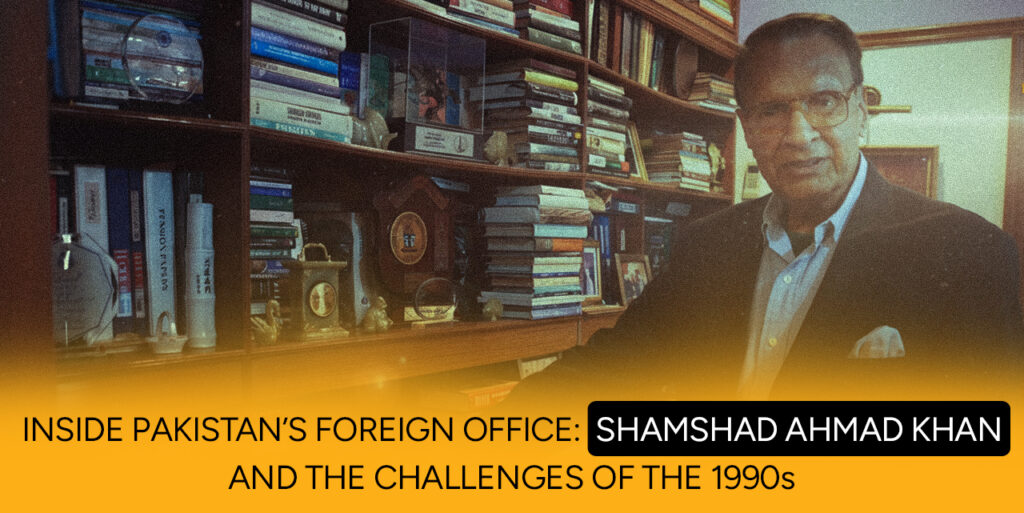The 1990s were a turning point in Pakistan’s political and diplomatic history. It was a decade full of political instability, economic turbulence, and shifting global alliances after the Cold War. For Pakistan’s foreign office, navigating through these years was nothing short of walking a tightrope. One name that stands out during this tumultuous period is Shamshad Ahmad Khan, the Foreign Secretary of Pakistan from 1997 to 2000, a time when diplomacy was truly in crisis.
This blog takes you inside the corridors of the Pakistan foreign office in the 1990s, exploring how Shamshad Ahmad led the country’s foreign affairs during one of the most challenging periods in Pakistan’s foreign office history.
The Political Backdrop: Instability at Home
The 1990s saw frequent changes in governments. Pakistan shifted between Benazir Bhutto and Nawaz Sharif, both struggling with internal political instability and opposition-led pressure. With 1990s political instability in Pakistan as a constant theme, foreign policy often took a backseat to domestic firefighting.
Despite this chaos, the foreign office had to maintain continuity and protect Pakistan’s interests on the global stage. That’s where experienced career diplomats in Pakistan, like Shamshad Ahmad, came into play, offering professionalism in the face of political inconsistency.
Who is Shamshad Ahmad Khan?
A seasoned career diplomat, Shamshad Ahmad had served in various high-profile international postings before becoming Foreign Secretary in 1997. His experience in multilateral diplomacy, especially with the United Nations, made him well-suited to lead the foreign ministry leadership during one of its most sensitive eras.
Under Prime Minister Nawaz Sharif, he played a key role in shaping Pakistan’s response to regional conflicts and international criticism. His leadership was tested by nuclear tensions, war clouds, and mounting internal vs external pressures on Pakistan’s image.
Kargil Conflict and Diplomacy in Crisis
One of the biggest tests for Shamshad Ahmad came in 1999 with the Kargil conflict between India and Pakistan. The operation, initially led by the military, was kept under wraps from much of the civilian government. Once it became international news, it fell upon the foreign office to manage the diplomatic strategy in tough times.
Shamshad had to brief the world, engage with the UN, and hold talks with global powers, all while maintaining Pakistan’s Kashmir policy. The Kargil War strained relations with India and even with long-standing allies like the United States.
The episode is often cited as a classic example of how institutional challenges in diplomacy, where the civil-military imbalance overshadows foreign policy, can cause long-term damage.
The Afghan War’s Lingering Impact
Another major theme of the 1990s was the Afghan war’s impact on Pakistan. Although the Soviet withdrawal had occurred by 1989, its aftershocks were deeply felt throughout the next decade. Refugee inflows, cross-border militancy, and the emergence of the Taliban created regional instability.
Pakistan’s support for the Taliban regime in Kabul came under intense global scrutiny, especially from the West. Shamshad Ahmad had the difficult task of justifying Pakistan’s Afghan policy while also trying to keep diplomatic relations intact.
The foreign ministry was often caught in the crossfire, balancing geopolitical interests with humanitarian concerns and international pressure.
Kashmir Policy and International Forums
Kashmir remained the focal point of Pakistan’s foreign relations under Nawaz Sharif, especially during the latter half of the 1990s. Shamshad Ahmad pushed for Pakistan’s case at the United Nations and other international forums.
As Foreign Secretary, he consistently highlighted human rights violations in Indian-administered Kashmir, while also calling for third-party mediation, a stance that drew mixed reactions globally.
Despite limited international traction, his efforts helped keep the Kashmir issue in global conversations and showcased Pakistan’s diplomatic strategy in tough times.
Facing Sanctions after Nuclear Tests
In 1998, Pakistan conducted nuclear tests in response to India’s, which led to economic sanctions from the US and other Western countries. Once again, the foreign office had to justify the decision, negotiate relief packages, and rebuild diplomatic trust.
Shamshad Ahmad played a central role in these efforts. As global pressure mounted, he worked to convey Pakistan’s perspective that the tests were necessary for national security and regional balance.
It was yet another example of diplomacy in crisis, handled with tact and clarity.
Foreign Office Culture: Between Politics and Policy
The 1990s exposed a core challenge within the Pakistan foreign office, the constant tug-of-war between political decisions and institutional diplomacy. While seasoned officers like Shamshad Ahmad tried to maintain consistency, they often had to respond to abrupt shifts in leadership or military-led strategies.
These institutional challenges in diplomacy made it harder for Pakistan to present a unified and long-term foreign policy agenda. But Shamshad’s tenure is still remembered for trying to hold the line, both literally and metaphorically, during chaotic times.
Legacy of Shamshad Ahmad Khan
Today, Shamshad Ahmad is seen as a symbol of professionalism in Pakistan’s diplomatic circles. His books and interviews reflect deep insight into the workings of the Pakistan foreign office in the 1990s, offering lessons on how to manage internal vs external pressures in a volatile environment.
His ability to communicate Pakistan’s stance, without losing diplomatic poise, makes him a standout figure in the history of Pakistan’s foreign ministry leadership.
Final Thoughts: Diplomacy Amidst Storms
The 1990s were not easy for Pakistan, at home or abroad. With changing governments, regional wars, and nuclear decisions, the country needed a steady hand in foreign affairs. Shamshad Ahmad provided just that.
His tenure reminds us that career diplomats in Pakistan are more than bureaucrats; they’re often the unsung guardians of national reputation and strategy during global storms.
As we look back at Pakistan’s foreign office history, the challenges of the 1990s, from Afghan war impacts to Kashmir policy and foreign relations under Nawaz Sharif, tell a powerful story of resilience, adaptation, and the quiet strength of diplomacy.
For more information and fascinating insights, watch Between Borders, Rava Documentary Films’ newest documentary, where Shamshad Ahmed Khan recalls the gripping details of the 90s.

